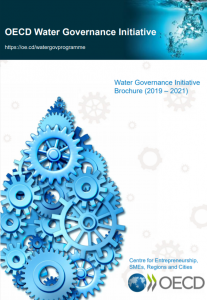Post by Andrew Allan
On Sunday 22nd March it was World Water Day, and this year’s theme was ‘water and climate change’. To honour the event, we are publishing five blog posts exploring different sides of the multifaceted relationship between water and climate change. Each post highlights research at the Centre that touches on these, some of the most urgent problems facing humanity today. Today’s post considers how better water governance can help address some of the issues covered in our earlier posts this week. Read together, these blogs indicate the degree of complexity involved in responding to particular areas where climate change impacts on water. Decisions that focus solely on energy, for example, will miss aspects of flood management, and vice versa.
Aligning sectoral policies in ways that facilitate effective adaptation is notoriously difficult. The need for coordinated government planning and responses across sectors and scales is particularly acute in relation to broad concepts like sustainable development. It is also one of the reasons why success is often so tricky to achieve in these areas. Climate change is no different: states seldom have ministries or agencies that are devoted to it alone, in part because of the fact that its impacts are felt across so many areas of life. Institutional frameworks for water also tend to be spread across a number of government bodies (separating the management of quantity, quality, surface and ground waters for instance), complicating matters further. An ever-expanding range of indicators have been established to try to assess the quality of the governance of water, including its institutional effectiveness – the OECD’s Water Governance Initiative is a great example of a comprehensive effort to assess this.

One of the elements that is often absent in this context is recognition of the importance of congruence across policy and law. Achievement of policy objectives, to the extent that law is needed, requires legal frameworks that are supportive and not actively hostile. Where a coherent and inclusive water policy has been developed and finalised (rather than being left at draft status), it should ideally provide some sense of deadlines that can then inform implementation strategies.
This question of timing is of particular concern given the timelines set by the UN Sustainable Development Goals. A quick glance at practice globally suggests that the development of a decent water policy is likely to take a few years. Translating this into practice – e.g. through law, economic tools and infrastructure development – will take three or four more years potentially. In relation to the legal frameworks that are put in place to do this, achievement of the standards sought will take much longer however: South Africa’s National Water Act has been in place since 1998 but still has a long way to go before it is fully implemented. Similarly, the EU Water Framework Directive came into force in 2000 but has not yet achieved its environmental objectives. This suggests that a more realistic timeline for the realisation of Sustainable Development Goal 6 on water might be 2050 rather than 2030 for countries that do not yet have a workable policy in place. Ensuring that adaptation to the impacts of climate change can be incorporated into water policy and law at this stage will prevent problems in the future and increase the longevity of both.

